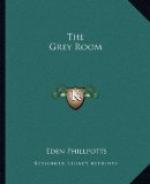“You can’t. He refused to let you.”
“I didn’t hear him.”
“Oh, yes, you did—everybody did. Besides, this is fairly my task— you won’t deny that. Chadlands will be mine, some day, so it’s up to me to knock this musty yarn on the head once and for all. Could anything be more absurd than shutting up a fine room like that? I’m really rather ashamed of Uncle Walter.”
“Of course it’s absurd but, honestly, I’m rather keen about this. I’d dearly love to add a medieval phantom to my experiences, and only wish I thought anything would show up. I beg you’ll raise no objection. It was my idea, and I very much wish to make the experiment. Of course, I don’t believe in anything supernatural.”
They went back to the billiard-room, dismissed Fred Caunter, the footman, who was waiting to put out the lights, and continued their discussion. The argument began to grow strenuous, for each proved determined, and who owned the stronger will seemed a doubtful question.
For a time, since no conclusion could satisfy both, they abandoned the centre of contention and debated, as their elders had done, on the general question. Henry declared himself not wholly convinced. He adopted an agnostic attitude, while Tom frankly disbelieved. The one preserved an open mind, the other scoffed at apparitions in general.
“It’s humbug to say sailors are superstitious now,” he asserted. “They might have been, but my experience is that they are no more credulous than other people in these days. Anyway, I’m not. Life is a matter of chemistry. There’s no mumbo jumbo about it, in my opinion. Chemical analysis has reached down to hormones and enzymes and all manner of subtle secretions discovered by this generation of inquirers; but it’s all organic. Nobody has ever found anything that isn’t. Existence depends on matter, and when the chemical process breaks down, the organism perishes and leaves nothing. When a man can’t go on breathing, he’s dead, and there’s an end of him.”
But Henry had read modern science also.
“What about the vital spark, then? Biologists don’t turn down the theory of vitalism, do they?”
“Most of them do, who count, my dear chap. The presence of a vital spark—a spark that cannot be put out—is merely a theory with nothing to prove it. When he dies, the animating principle doesn’t leave a man, and go off on its own. It dies too. It was part of the man—as much as his heart or brain.”
“That’s only an opinion. Nobody can be positive. We don’t know anything about what life really means, and we haven’t got the machinery to find out.”
“By analogy we can,” argued Tom. “Where are you going to draw the line? Life is life, and a sponge is just as much alive as a herring; a nettle is just as much alive as an oak-tree; and an oak-tree is just as much alive as you are. What becomes of its vital spark when you eat an oyster?”




